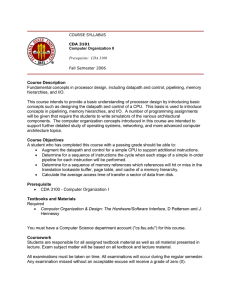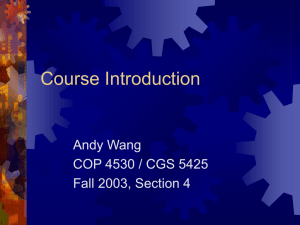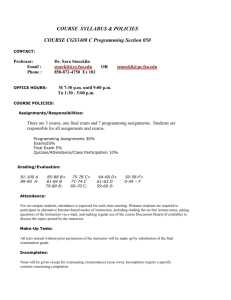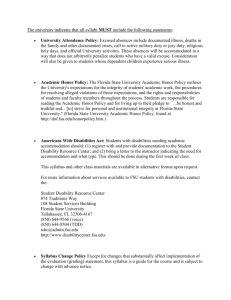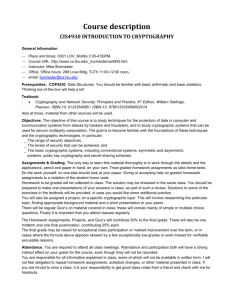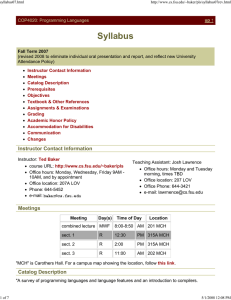Document 12288859
advertisement
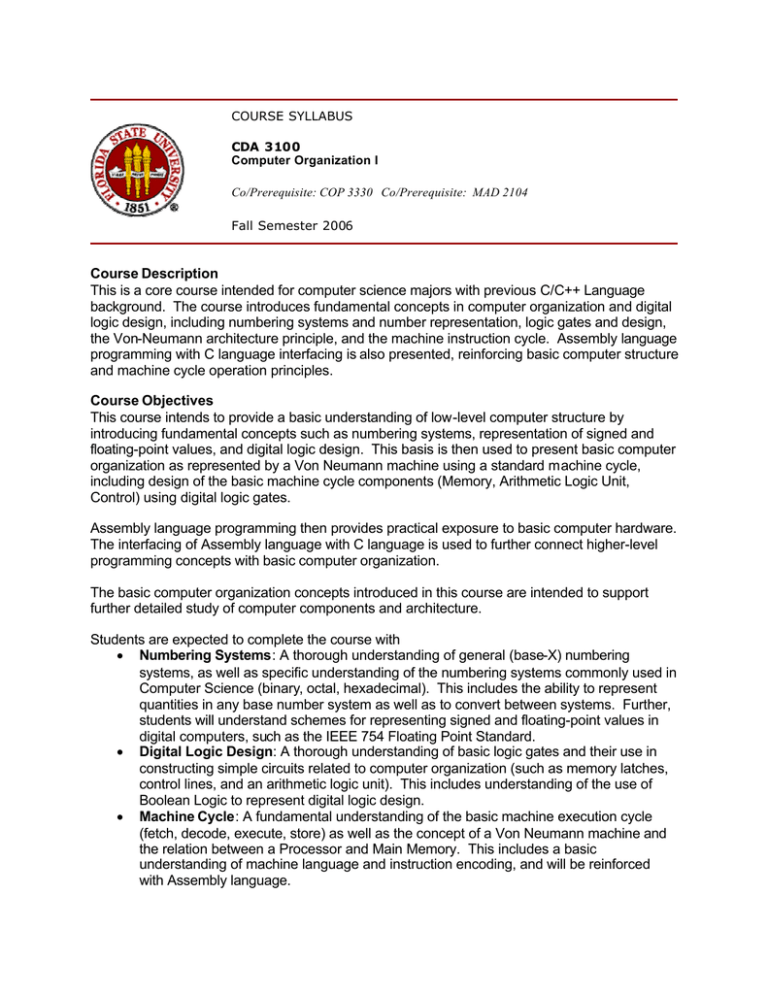
COURSE SYLLABUS CDA 3100 Computer Organization I Co/Prerequisite: COP 3330 Co/Prerequisite: MAD 2104 Fall Semester 2006 Course Description This is a core course intended for computer science majors with previous C/C++ Language background. The course introduces fundamental concepts in computer organization and digital logic design, including numbering systems and number representation, logic gates and design, the Von-Neumann architecture principle, and the machine instruction cycle. Assembly language programming with C language interfacing is also presented, reinforcing basic computer structure and machine cycle operation principles. Course Objectives This course intends to provide a basic understanding of low-level computer structure by introducing fundamental concepts such as numbering systems, representation of signed and floating-point values, and digital logic design. This basis is then used to present basic computer organization as represented by a Von Neumann machine using a standard machine cycle, including design of the basic machine cycle components (Memory, Arithmetic Logic Unit, Control) using digital logic gates. Assembly language programming then provides practical exposure to basic computer hardware. The interfacing of Assembly language with C language is used to further connect higher-level programming concepts with basic computer organization. The basic computer organization concepts introduced in this course are intended to support further detailed study of computer components and architecture. Students are expected to complete the course with • Numbering Systems: A thorough understanding of general (base-X) numbering systems, as well as specific understanding of the numbering systems commonly used in Computer Science (binary, octal, hexadecimal). This includes the ability to represent quantities in any base number system as well as to convert between systems. Further, students will understand schemes for representing signed and floating-point values in digital computers, such as the IEEE 754 Floating Point Standard. • Digital Logic Design: A thorough understanding of basic logic gates and their use in constructing simple circuits related to computer organization (such as memory latches, control lines, and an arithmetic logic unit). This includes understanding of the use of Boolean Logic to represent digital logic design. • Machine Cycle: A fundamental understanding of the basic machine execution cycle (fetch, decode, execute, store) as well as the concept of a Von Neumann machine and the relation between a Processor and Main Memory. This includes a basic understanding of machine language and instruction encoding, and will be reinforced with Assembly language. • Assembly Programming: Basic development skills in a representative Assembly language, as well as an understanding of the interfacing of Assembly language with C language. Prerequisites • C/C++ Language Programming. • Discrete Mathematics (Co/Prerequisite). Textbooks and Materials Required • Computer Organization & Design: The Hardware/Software Interface, D Patterson and J. Hennessy • Assembly Language for Intel-Based Computers, 4th Edition, Kip R. Irvine, Prentice Hall, 2003 You must have a Garnet account ("garnet.fsu.edu" or "fsu.edu") and a Computer Science department account ("cs.fsu.edu") for this course. Coursework Students are responsible for all assigned textbook material as well as all material presented in lecture. Exam subject matter will be based on all textbook and lecture material. All examinations must be taken on time. All examinations will occur during the regular semester. Any examination missed without an acceptable excuse will receive a grade of zero (0). All assignments must be submitted on time. All assignments will occur during the regular semester. Any assignment missed without an acceptable excuse will receive a grade of zero (0). An acceptable excuse that applies during the time an assignment is assigned will receive additional days to work on the assignment, only up to the number of days covered by the excuse. Assignments not submitted within the number of excused days past the assignment's original due date will receive a zero (0). Grading The following table lists individual point values for examinations and assignments: Scoring (out of 160) Exam 1 Exam 2 Exam 3 Exam 4 Project 1 Project 2 Project 3 Project 4 Total 30 points 30 points 30 points 30 points 10 points 10 points 10 points 10 points 160 points Final scores will be calculated by comparing the total points accumulated by a student to a total of 160 points. Final grades will be assigned based on the table below. No curve is applied. 90% [144, 160] A 80% [128, 144) B 70% [112, 128) C 60% [96, 112) D < 60% < 96 F Academic Dishonesty Students are subject to the Academic Honor Code published in The Florida State University Bulletin and the Student Handbook. The Academic Honor System of The Florida State University is based on the premise that each student has the responsibility (1) to uphold the highest standards of academic integrity in the student's own work, (2) to refuse to tolerate violations of academic integrity in the university community, and (3) to foster a high sense of integrity and social responsibility on the part of the university community. Please refer to the following web sites for a complete explanation of the Academic Honor Code. http://www.fsu.edu/Books/Student-Handbook/codes/honor.html http://www.fsu.edu/Books/Student-Handbook/ In particular, note that students may not give or receive help of any kind on programming projects. This means, among other things, that students are not permitted to read other student's code (on paper OR on screen) or discuss design or implementation of programming projects with anyone other than with the course staff. When studying for this course collaboration among students is encouraged. However, all submitted assignments and examinations are expected to be the work product of the individual student alone, performed without unauthorized assistance. There is a line between helping fellow students learn and performing work for someone else and we all know where that line falls. If a student is at all uncertain about any act of collaboration discuss it with course staff before the act. DO NOT work together on submitted assignments. The work you submit must be yours, and yours alone. Violations of this policy will result in expulsion from the course and a failing grade for all parties involved, as well as referral to further academic dishonesty proceedings as necessary. Americans with Disabilities Act Students with disabilities needing academic accommodation should: (1) register with and provide documentation to the Student Disability Resource Center; (2) bring a letter to the instructor indicating the need for accommodation and what type. This should be done during the first week of class. For more information about services available to FSU students with disabilities, contact the Student Disability Resource Center 97 Woodward Avenue, South Florida State University Tallahassee, FL 32306-4167 (850) 644-9566 (voice) (850) 644-8504 (TDD) sdrc@admin.fsu.edu http://www.fsu.edu/~staffair/dean/StudentDisability/ (This syllabus and other class materials are available in alternative format upon request.) Syllabus Change Policy This syllabus is a guide for the course and is subject to change with advance notice. Such notice will be in the form of an announcement by e-mail to all students through their Garnet accounts, and by voice in course lecture.

